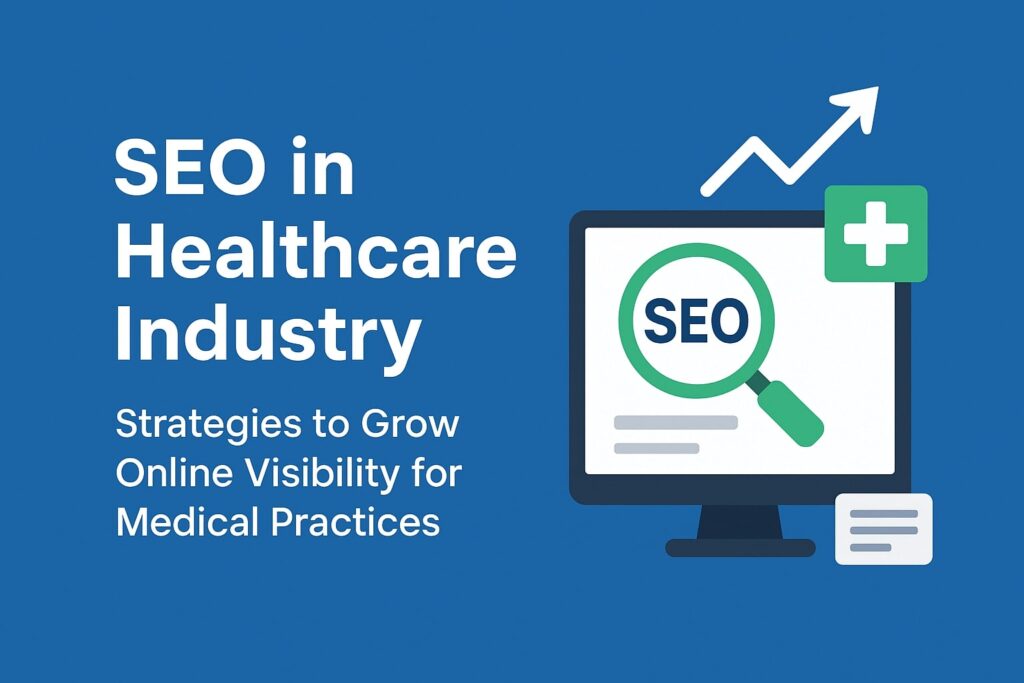
SEO in Healthcare: Driving Patient Engagement Through Search Visibility
In today’s highly digital world, having a strong online presence is crucial for hospitals and clinics aiming to connect effectively with patients. For healthcare providers in Australia, implementing effective SEO and specialized Healthcare SEO strategies can significantly enhance visibility, patient engagement, and credibility in local markets.
Table of Contents
- Why SEO Matters in Healthcare
- What is Healthcare SEO?
- Core Healthcare SEO Strategies for Australian Hospitals and Clinics
- Technical SEO for Healthcare Websites
- Content Marketing and Patient Engagement Strategies
- Local SEO and Geo-Targeting in Australia
- Measuring SEO Success in Healthcare
- Trending FAQs on Healthcare SEO for Hospitals and Clinics
Why SEO Matters in Healthcare
Patients increasingly search online for healthcare services, specialists, and health information before making choices. According to studies, over 70% of Australian patients start their healthcare journey with a local online search. Without proper SEO, your hospital or clinic risks invisibility in search engine results, losing potential patients to competitors.
SEO positions your healthcare brand prominently, building trust and directing qualified traffic to your website. It’s not just about rankings; it’s about delivering a seamless search experience that helps patients find relevant answers and services quickly.
What is Healthcare SEO?
Healthcare SEO is a specialized branch of search engine optimization focusing on medical and health-related websites. It involves optimizing websites, content, and local presence to rank well for healthcare-specific queries like symptoms, treatments, doctor searches, and facility availability while maintaining compliance with healthcare regulations.

Healthcare SEO focuses on:
- Building patient trust through authoritative and accurate content
- Ensuring website accessibility and security
- Navigating medical jargon for better patient understanding
- Optimizing for local searches relevant to hospitals and clinics in regions like Australia
This niche requires tailored keyword strategies, content handling, and technical implementations unique to healthcare.
Core Healthcare SEO Strategies for Australian Hospitals and Clinics
1. Keyword Research & Targeting
- Focus on Australian healthcare-specific keywords, combining medical terms with local modifiers (e.g., “best cardiologist Sydney”, “Melbourne physiotherapy clinic”).
- Use keyword tools like Google Keyword Planner, SEMrush, and AnswerThePublic to discover patient intent questions and trending health topics.
- Include long-tail keywords as they often represent more specific service or symptom-related patient queries.
2. High-Quality, Trustworthy Content
- Develop well-researched, medically reviewed blog posts, FAQs, and service pages that address common patient concerns.
- Create content that balances medical accuracy with patient-friendly language.
- Use visuals like infographics and videos to explain complex treatments or procedures.
- Highlight hospital/clinic accreditations, practitioner bios, and patient testimonials to build trust.
3. User Experience (UX) Optimization
- Ensure a responsive, fast-loading website optimized for all devices.
- Simplify navigation to allow easy access to appointment booking, contact information, and health resources.
- Use clear call-to-actions (CTAs) guiding patients to book consultations or seek emergency care.
4. Local SEO for Geographic Relevance
- Optimize Google My Business (GMB) profiles for every hospital and clinic location.
- Encourage patients to leave reviews on GMB and other local directories such as HealthEngine and TrueLocal.
- Embed Google Maps on location pages.
- Use location-based keywords consistently in titles, descriptions, headers, and content.
5. Technical SEO Essentials
- Implement HTTPS for website security, essential for patient data protection and SEO ranking.
- Use schema markup tailored to healthcare: medical conditions, procedures, physicians, and ratings.
- Fix crawl errors, broken links, and duplicate content issues regularly.
- Optimize site architecture for clear hierarchy and URL structure.
- Ensure accessibility compliance (WCAG standards) for users with disabilities.
6. Backlink Building
- Earn backlinks from authoritative health organizations, journals, local health directories, and community pages.
- Participate in Australian health forums, webinars, and events to boost online reputation and citations.
- Guest post or collaborate with medical influencers on relevant blogs.
Technical SEO for Healthcare Websites
Healthcare websites tend to have complex structures. Key technical SEO considerations include:
- Secured Hosting and HIPAA Compliance: Use secure servers and ensure compliance with Australian health privacy laws.
- Speed Optimization: Minimize loading times to keep bounce rates low.
- Mobile Optimization: Over 60% of health-related searches are on mobile in Australia.
- Structured Data: Use healthcare schema types like MedicalBusiness, Physician, MedicalCondition to improve rich snippet eligibility.
- XML Sitemaps and Robots.txt: Maintain properly configured sitemaps and robots files to control crawling and indexing.
Content Marketing and Patient Engagement Strategies
Producing authoritative content is pivotal. Strategies include:
- Publishing blogs focused on local health issues, seasonal conditions, or wellness tips.
- Creating video tours of hospital facilities and introducing medical specialists.
- Utilizing FAQ pages optimized for voice search focusing on question-based keywords.
- Offering interactive symptom checkers or appointment booking tools tailored to Australian patient preferences.
Local SEO and Geo-Targeting in Australia
Local SEO is critical for healthcare providers who rely heavily on patients within a serviceable radius.
- List your hospital and clinics on Australian directories (Yellow Pages, HealthEngine).
- Use localized landing pages customized for regions like Sydney, Melbourne, Brisbane, etc.
- Encourage reviews explicitly from patients in those locations.
- Align your social media targeting and ads to Australian healthcare consumers.
Measuring SEO Success in Healthcare
Track these KPIs regularly:
- Organic traffic growth segmented by location
- Keyword rankings (especially local and service-specific terms)
- Conversion rates for appointment bookings or contact form submissions
- Bounce rates and user engagement metrics on medical content
- Patient reviews and online sentiment analysis
Advanced analytics with heat maps and user flow can reveal navigation issues and patient behavior insights to optimize further.
Trending FAQs on Healthcare SEO for Hospitals and Clinics
1. What is the importance of SEO for healthcare providers in Australia?
SEO helps hospitals and clinics increase visibility online, attract more local patients, and build trust through authoritative content.
2. How is Healthcare SEO different from general SEO?
Healthcare SEO requires compliance with medical regulations and focuses on accurate, trustworthy content while addressing sensitive patient queries.
3. What are effective local SEO strategies for clinics?
Optimizing Google My Business, collecting patient reviews, and creating location-specific landing pages are key to dominate local searches.
4. How long does it take to see results from Healthcare SEO?
Results typically begin to show within 3-6 months but can vary based on competition and SEO strategy effectiveness.
5. Can video content improve Healthcare SEO?
Yes, videos increase engagement, educate patients better, and improve time spent on site, contributing positively to SEO metrics.
Conclusion
Implementing targeted SEO and sector-specific Healthcare SEO strategies is paramount for hospitals and clinics in Australia to dominate local search landscapes, increase patient trust, and build a sustainable online presence. Combining technical optimizations, content excellence, and local SEO focus ensures healthcare providers connect effectively with their patients in the digital age.
Investing in expert SEO services tuned to healthcare’s unique challenges and Australian regulations can significantly boost your hospital or clinic’s online success.